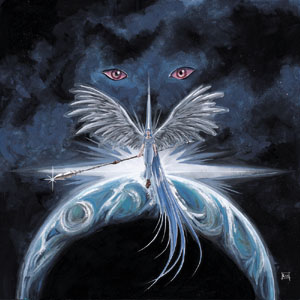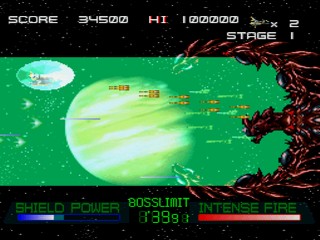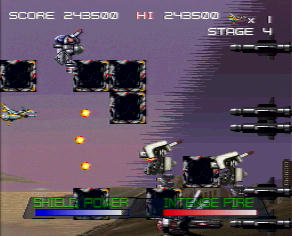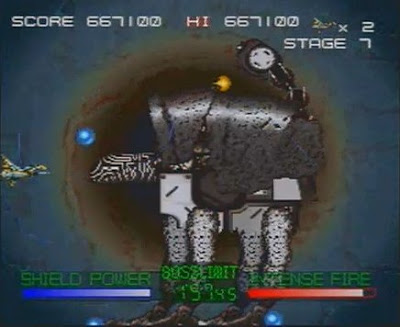This post has not been edited by the GamesBeat staff. Opinions by GamesBeat community writers do not necessarily reflect those of the staff.
There’s a lot to fault in Gaia Seed, a side scrolling 2D shoot-‘em-up originally released for the Sony PlayStation that was recently re-released for PSN. But for all its mediocre combat, poor interface, and middling graphics, the game has some fantastic highs. The music is largely exceptional, the level design is solid, and it creates a wonderful sense of place.
Perhaps the most impressive thing about Gaia Seed, though, is that it tackles big storytelling and narrative questions without resorting cut scenes or lengthy slabs of text. Join me now as I examine this journey across the galaxy and back again in a quest for mankind’s salvation.
In conventional terms, the story is horribly vague and confusing. The introduction seems like it was written as part of a word association exercise that uses the twin themes of humanity’s expansion beyond its resources and exploration of the universe. And if, like me, you lack fluency in Japanese, this is made all the more unclear as a slideshow of intriguing but vague imagery is displayed while a disembodied voice reads out the poorly translated script in a thick Japanese accent.
Yet if you can look past the poor translation and underdone introduction, you may find that Gaia Seed tells a fascinating story rooted in mankind’s endless lust for resources that is tinged with a subtle sadness and loneliness.

Our lust for resources has pushed the planet to its limits, with war, genocide, and environmental destruction rending it uninhabitable. Birds and other wildlife have died, while the cities are clogged with thick pollution. A group of scientists are toiling away at something called the Gaia Seed Project, which aims to undo the damage and restore the Earth to its former glory.
This is where you come in. You are tasked with finding a holy grail of sorts, leading the charge in a pitched battle of man against the universe; in search of the object, resource, or entity that will allow the Gaia Seed Project to reach completion. You are a hero, as long as you succeed.
The lonely pilot of a single (space) battleship, you begin outside Uranus, surrounded by debris from broken and destroyed machines together with what appears to be a chain-link fence — that uses lasers in place of metal chain. You must fight your way through this portrait of man’s lustful, greedy excess, eventually reaching a serpent boss that bears an uncanny resemblance to a phoenix.

Defeating this boss leads you to a different planet, less affected by human tinkering. A pitched battle appears to be taking place in the background as you head down to the planet’s surface. It seems you are not wanted here, either, as all kinds of exotic-looking enemy ships try to blow you to smithereens.
Getting past another boss, reminiscent of HAL from 2001: A Space Odyssey, leads to a major change in mood. The music turns from ambient and mysterious to a throbbing hip hop beat, as you descend at an ever-increasing rate until you suddenly splash into a body of water.
From here, you explore a series of underground caves that are populated by some of the strangest creatures you will ever see. Moving chains of fish-like creatures speed across the screen, while others that look more like oversized brains take a more leisurely pace, and bulbous things jut out from the rocks. All these creatures are hostile, and they seem to be in league with the enemy ships that continue to attack you. It feels as though you are invading their world.
There is yet more to the story, though. The music soon changes again, becoming more low-key and somber; almost melancholic, with a haunting vocal track. The world — now above ground — is deserted, yet serene. There are no people here. But you can’t revel in the peacefulness for long; the battle must continue. You now fight ships larger and faster than your own, many of which are armed with huge missiles. The battle continues into a cityscape while the colors get drained and muted, more washed-out. Something feels wrong, but you can’t turn back.

Now you enter a world of pulsating color, flying between two bands of thick gray wave-like clouds. Lightning flashes across the background, a wall of war-torn bricks. A storm is brewing, but you continue onwards. The clouds shift in color, beginning a dance of light and shadow. Rain falls, lashing the scene with turbulence. The music fades to nothing.
A strange amorphous blue blob emerges, assaulting you with spears of blue light and other, smaller blobs — to the sound of a bass-heavy techno beat. Defeating this blob puts you back in open space — did you just destroy that planet? Was that blob its essence or core?
Now the music turns almost triumphant; your journey is nearly complete. A short but difficult sequence leads to a similarly short but difficult boss fight against a huge battleship, which gives way to your final enemy. This gigantic metal space monster looks like a turtle with the legs of an ancient land predator, and possesses a tail that shoots lasers in all directions. It seems to be protecting something, which the background suggests is a seed.

I'm about to reveal how the game ends. Stop reading here if this bothers you.
Defeating the metal beast, however, brings only destruction. It falls, careening down to the Earth. Rather than saving your people, you have secured their fate. The hero is filled with despair and remorse. The Gaia Seed Project is incomplete and the Earth is in ruins. Your journey caused nothing but destruction. You are no hero.
But that is not the only way Gaia Seed can end. The boss has a countdown timer. If you can survive until that timer runs out, it will disappear, revealing a large seed that floats in space. Shoot this seed and an angel will materialize around it, with the seed appearing lodged in her chest. Destroying this angel brings pain of a different kind. The Gaia Seed Project remains incomplete, and your people leave you in search of new resources. You are forgotten; a hero to no-one.
Leave the seed be, however, and the disembodied voice of the introduction speaks of his sad torment: “I had no will to fight. Was there much point to fighting the battle?” You meet Gaia, who was mistakenly thrust out into space — separated from the Earth — by man. You and Gaia become one as she restores the Earth to a state of balance. The skies become clear, birds fly, flowers blossom, and wildlife returns.
![]() But the hero has a question for the world — one that is left unanswered. Can we become one with the Earth?
But the hero has a question for the world — one that is left unanswered. Can we become one with the Earth?
This sentiment is very much a clichéd one, but the warning is real. Gaia Seed is a meditation on the idea that at some point we — the human race — will over-extend ourselves, and our world may never recover. Yet it also explores a more subtle idea — one that has since been the subject of Flower.
It asks us how far we, as individuals, are willing to separate ourselves from nature in the quest for material gain and scientific progress — and at what price. Do we even know why we fight?
